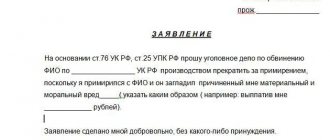Legal advice > Administrative law > Paperwork > Who can file a missing person report and how to properly organize searches
A missing person is a situation, unfortunately, familiar to many citizens of the Russian Federation. Of course, the circumstances are not very pleasant, but you definitely shouldn’t panic if they exist.
Having discovered a missing person, it is necessary to organize a search for him as quickly as possible. But who can initiate search efforts? In what form should I submit the application? Where should I submit it? Let's figure it out.
Proper procedure in the event of a missing person
No need to panic!
Once again, when you discover a missing person, the main thing is not to panic. First of all, it is necessary to conduct a detailed analysis of the situation. At a minimum, it is important to minimize as much as possible the chances that the missing person, as they say, went on a spree or deliberately does not make contact with loved ones.
If the missing person and the seriousness of the situation are confirmed, then you will have to do the following:
- First, go to the nearest law enforcement department. Inform the duty officer about the incident and ask him for a form to fill out a statement.
- Having correctly drawn up the document, indicating in its contents everything that will help in the search for the missing person, hand it over to authorized persons. Do not accept any excuses like “come back on the 3rd day of disappearance”; a missing person’s report must be accepted here and now, regardless of how long the missing person has been out of contact. This procedure is determined by law, or more precisely, by Articles 144-145 of the Criminal Procedure Code of the Russian Federation and the Order of the Prosecutor General’s Office of the Russian Federation and the Ministry of Internal Affairs of the Russian Federation dated February 27, 2010, number 70/122 “On approval of the Instructions on the procedure for considering applications, reports of crimes and other information about incidents related to the unknown disappearance of citizens.”
- After this, try to check all the possible locations of the missing person, perhaps he will be found. In the process of such verification, it would not be superfluous to interview acquaintances of the missing person or other persons who may have seen him before his disappearance.
- The last step will be to contact voluntary organizations that carry out activities to search for missing citizens. You can find out about the presence of such associations on the Internet resources of your locality.
It is worth noting that the success of subsequent searches largely depends on the efficiency of the activities described above. Therefore, do not delay organizing the latter and try to start looking for the missing person as soon as possible after his disappearance.
When a manhunt is announced
A search can be announced in relation to a suspect or accused of committing a crime, in relation to a missing person, in relation to persons who evade military service and in relation to debtors for whom there is enforcement proceedings in the Federal Bailiff Service.
Moreover, Article 65 of the Federal Law “On Enforcement Proceedings” gives the bailiff the right to put a debtor on the wanted list, including the federal one, if local regional ones have not yielded results, for a debt of over 10,000 rubles.
A federal search can be announced: for missing people - three months after a local and regional search, for criminals six months after a local and regional search.
Who can apply
Not only a family member can file a missing person report
So, as was clarified in the previous paragraph of the article, you can report a missing person regardless of the statute of limitations for this phenomenon. But who has the right to initiate searches? Let's try to figure it out.
In fact, according to the current legislation of the Russian Federation, any person interested in this action has the right to file a missing person report, for example:
- close or distant relatives of the disappeared person;
- friends or comrades of the latter;
- employer or employees of the missing person;
- other citizens of the Russian Federation who wish to find a person for any of their reasons.
Refusal to accept paperwork for an applicant due to “insufficient proximity to the missing person” or similar circumstances is unacceptable and is a complete violation of the law on the part of police officers. If such circumstances exist, demand from law enforcement officers a reasoning for their actions, and in the absence of such, complain to the Prosecutor's Office about the outrages of the employees, having first submitted a statement of the disappearance of the person to another police department.
In order to make sure that the application was accepted and the search will be organized, be sure to ask the authorized person for the full name of the employee who completed the application and the registration number of the document after submitting the document. Having this information, in the absence of proper performance of duties on the part of police officers, they can be punished in the future.
How much is added to the term if you were on the federal wanted list?
Hello. How much is added to the term if you were on the federal wanted list?
Lawyer Antonov A.P.
Good afternoon
According to Art. 78 of the Criminal Code, a person is released from criminal liability if the following periods have expired from the date of commission of the crime: a) two years after the commission of a crime of minor gravity; b) six years after committing a crime of average gravity; c) ten years after the commission of a serious crime; d) fifteen years after the commission of a particularly serious crime. The statute of limitations is calculated from the day the crime was committed until the court verdict enters into legal force. If a person commits a new crime, the statute of limitations for each crime is calculated independently. The running of the statute of limitations is suspended if the person who committed the crime evades the investigation or trial or evades payment of a court fine imposed in accordance with Article 76.2 of this Code. In this case, the running of the limitation period is resumed from the moment of detention of the specified person or his surrender. The issue of applying the statute of limitations to a person who has committed a crime punishable by death or life imprisonment is decided by the court. If the court does not consider it possible to release the specified person from criminal liability due to the expiration of the statute of limitations, then the death penalty and life imprisonment are not applied. To persons who have committed crimes provided for in Articles 205, 205.1, 205.3, 205.4, 205.5, parts three and four of Article 206, part four of Article 211, Articles 353, 356, 357, 358, 361 of this Code, as well as those associated with the implementation of terrorist activities of the crime provided for in Articles 277, 278, 279 and 360 of this Code, statutes of limitations do not apply. According to Art. 15 of the Criminal Code, depending on the nature and degree of public danger, the acts provided for by this Code are divided into crimes of minor gravity, crimes of medium gravity, serious crimes and especially serious crimes. Crimes of minor gravity are recognized as intentional and careless acts, for the commission of which the maximum punishment provided for by this Code does not exceed three years of imprisonment. Crimes of average gravity are recognized as intentional acts, for the commission of which the maximum penalty provided for by this Code does not exceed five years of imprisonment, and careless acts, for the commission of which the maximum penalty provided for by this Code exceeds three years of imprisonment. Serious crimes are intentional acts for which the maximum punishment provided for by this Code does not exceed ten years of imprisonment. Particularly serious crimes are intentional acts, the commission of which is punishable by this Code in the form of imprisonment for a term of over ten years or a more severe punishment. Taking into account the actual circumstances of the crime and the degree of its public danger, the court has the right, in the presence of mitigating circumstances and in the absence of aggravating circumstances, to change the category of the crime to a less serious one, but not more than one category of crime, provided that for committing the crime specified in part three of this article, the convicted person is sentenced to a sentence not exceeding three years of imprisonment, or another more lenient punishment; for committing a crime specified in part four of this article, the convicted person is sentenced to a punishment not exceeding five years of imprisonment, or another more lenient punishment; for committing a crime specified in part five of this article, the convicted person is sentenced to a punishment not exceeding seven years of imprisonment. According to Art. 69 of the Criminal Code, in case of aggregation of crimes, punishment is imposed separately for each crime committed. If all crimes committed in aggregate are crimes of minor or medium gravity, or preparation for a grave or especially grave crime, or an attempt at a grave or especially grave crime, the final punishment is imposed by absorbing a less severe punishment with a more severe one, or by partially or completely adding up the assigned punishments. In this case, the final punishment cannot exceed more than half the maximum term or amount of punishment provided for the most serious crime committed. If at least one of the crimes committed in aggregate is a grave or especially grave crime, then the final punishment is imposed by partial or complete addition of punishments. In this case, the final punishment in the form of imprisonment cannot exceed more than half the maximum term of punishment in the form of imprisonment provided for the most serious crime committed. In the case of a combination of crimes, additional types of punishment may be added to the main types of punishment. The final additional punishment in case of partial or complete addition of punishments cannot exceed the maximum term or amount provided for this type of punishment by the General Part of this Code. According to the same rules, punishment is imposed if, after the court has rendered a verdict in the case, it is established that the convicted person is also guilty of another crime that he committed before the court’s verdict in the first case. In this case, the final punishment includes the sentence served under the first court verdict. Thus, the mere presence of a search is not an aggravating circumstance. If you have already been sentenced and you escape, it will be added to the new punishment.
Sincerely, lawyer Anatoly Antonov, managing partner of the law firm Antonov and Partners.
Still have questions for your lawyer? Ask them right now here, or call us by phone in Moscow +7 (499) 288-34-32 or in Samara +7 (846) 212-99-71 (24 hours a day), or come to our office for a consultation (by pre-registration)!
How to write an application correctly and where to submit it
Unfortunately, the statistics of missing persons is disappointing...
As it became clear from the information presented earlier, a missing person report must be filed with the police. The department of the government agency is obliged to accept the document, regardless of whether it is provided at the applicant’s place of residence or not, how complete the information content of the application is and whether the applicant has evidence that he is directly interested in finding the missing person.
Refusal for such reasons is illegal, which is already punishable according to the Criminal Code of the Russian Federation and the Code of Administrative Offenses of the Russian Federation. As for the actual preparation of the application, it must contain:
- in the upper right corner of the A4 sheet, it is indicated to whom and from whom this application is being submitted (full name of the head of the internal affairs department, full name of the internal affairs department, full name and address of the applicant);
- just below, right in the center – the name of the paper in free form, but containing the word “STATEMENT”;
- further in the center - a detailed, most accurate and concise description of the problem that has arisen and an indication of the applicant’s request for the police to take measures to search for the missing person (here it is important to indicate all known information about the missing person, data about his expected and last whereabouts, as well as other information that will help in search of a missing person);
- in the lower left corner - signature and date of application.
To better understand the essence of writing statements about a missing citizen, it would be useful to consider the following example:
To the Head of the Pyatnitsky Department of Internal Affairs for the city of Moscow – I.I. Ivanov. From citizen Petr Petrovich Broshen, living at the address: Moscow, st. Capitalista, building 14, apartment 7
MISSING PERSON REPORT
More than a day ago, I, Abandoned Pyotr Petrovich, discovered the disappearance of my wife, Abandoned Inessa Pavlovna, born on April 12, 1980, living at Moscow, st. Capitalist, building 14, apartment 7, and working at Moscow, st. Sovetskaya, house 178.
The missing woman did not answer calls, did not communicate in any other way, and was not at work. She disappeared on February 23, 2021, after not returning from work at the required 8:00 pm. Usually I went home on the 21st bus from the stop at my place of work straight to home.
Referring to the above and the norms of the legislation of the Russian Federation, I ask you to organize a search for my wife immediately.
Compiled February 25, 2021. Applicant's signature: "BPP".
In general, a well-written statement about a missing person looks something like this, so using it as a sample, if you need to draw up a similar paper, would be a pretty good decision.
Who is wanted?
For criminals and crimes, the investigator and interrogating officer of those law enforcement agencies that are investigating this criminal case can declare a search.
Any relative of the missing person can file a search for a missing citizen. The relative goes to the territorial police department and writes a statement according to the sample, as a rule, it indicates who disappeared, under what circumstances, namely, when it became known that he was missing, when he stopped answering phone calls, when he was last seen.
Be sure to indicate what he was wearing, when you last saw him, possible places where he could be, distant relatives, all contacts.
It often happens that a person disappears and starts drinking. It is clear that the relatives are worried, they write a statement that he is missing, and if this statement indicates what they call addresses and appearances, then it will be easier to find this person, and of course, a photograph as close as possible to the day when he has gone.







